Welcome to our SEND Hub!
Information, advice and links about parenting and special educational needs and disabilities to help you support your family.
From this page you can find a glossary of terms relating to particular needs as well as documents to refer to with regard to SEND and your child in school.
Concerned about your child?
If you have a concern about your child, please fill out the form from the link below:
What is Autism?
Autism is a lifelong neurodevelopmental condition that can be recognised from early childhood. Each autistic person will have their own individual strengths and challenges.
Autistic people will have some challenges around social interaction and communication. For some, there may be limited or no spoken communication but often the challenges can present difficulties in understanding others’ intentions, social cues, body language and/or facial expressions. Social interactions can be hard work for autistic people.
There is usually a “preference for sameness” and a tendency for restricted or repetitive patterns of thought or behaviour, this can present in several different ways. Repetition and familiarity can be comforting and help to manage anxiety. Unexpected changes or breaks from familiar routine can be difficult and an autistic person might need longer to process these.
Autistic people often have sensory differences and can experience sound, smells, sight, taste and touch so acutely that this can be really overwhelming at times.
For more information about ASC, follow the link to ADDvancedSolutions website here: https://www.addvancedsolutions.co.uk/neurodevelopmental-conditions/autism/
What is Dyslexia?
Dyslexia is a common learning difficulty that mainly causes problems with reading, writing and spelling. It's a specific learning difficulty, which means it causes problems with certain abilities used for learning, such as reading and writing.
The British Dyslexia Association (BDA website) has adopted the Rose (2009) definition of dyslexia:
"Dyslexia is a learning difficulty that primarily affects the skills involved in accurate and fluent word reading and spelling. Characteristic features of dyslexia are difficulties in phonological awareness, verbal memory and verbal processing speed. Dyslexia occurs across the range of intellectual abilities. It is best thought of as a continuum, not a distinct category, and there are no clear cut-off points."
What is Dyscalculia?
Dyscalculia is a specific and persistent difficulty in understanding numbers which can lead to a diverse range of difficulties with mathematics. It will be unexpected in relation to age, level of education and experience and occurs across all ages and abilities.
SEND Parent Information
Related Blog Posts
ADDvanced Solutions Newsletter Autumn 2
ADDvanced Solutions Community Network has released their Autumn 2 programme, offering support to parents on a wide variety of subjects eg. Organisational skills, Masking, Theory of Mind, Preparing for Christmas and more. The courses are held in a variety of locations, at different times of the…
ADDvanced Solutions Newsletter Autumn 1
ADDvanced Solutions Community Network has released their Autumn 1 Programme, offering support to parents on a wide variety of subjects eg. supporting friendships, sleep difficulties, supporting organisational skills, Introduction to Autism and much more. The courses are held in a variety of…
SEND Early Years - Coffee morning
The Early Years SEND Team are holding a parent/carer coffee morning at South Sefton Adult Education Centre on Friday 12th September between 10am - 12pm. This gives an opportunity to find out about SEND processes and the support available available in Sefton and to meet with other professionals. …

